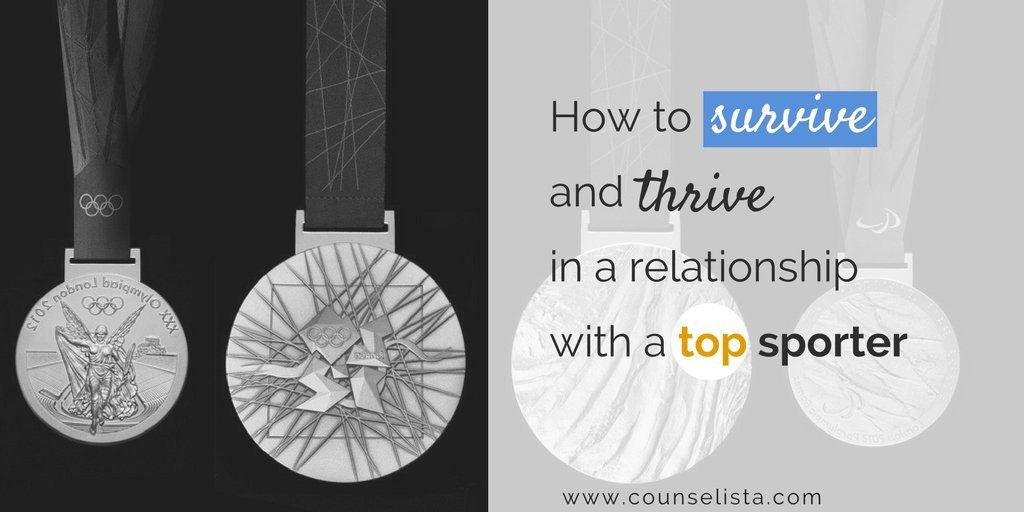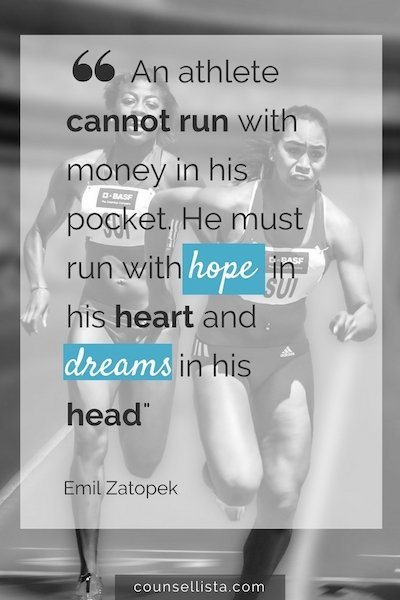Intimate Tickles Thought You Might Be Interested
Published: Mon, 05 Mar 2018 17:21:22 +0000
View Original Article
Category: Better Relationships | Author and Publisher: Elly Prior | First published: 05-03-2018 | Modified: 07-03-2018
When your partner is a top-sportsman or woman , he or she will take part in European, World and/or Olympic championships.
You may or may not be there to share their joy when they reach and surpass their sporting goals (or not), be that in athletics, tennis, horse riding, skating, skiing, or any other (team) sport. As the (long-term) partner of an elite athlete, you may well have made a considerable contribution to their success – even if that isn’t always recognised!. And you too may well have had a taste of the attention and glamour that can come with high profile sporting achievements.
How much of a contribution you make depends on the stage of your relationship – from “we’re kind of close” to “we’re living together or married with children” – and your commitment.
But, top-sport doesn’t necessarily go well with being in a close couple relationship as there can be some considerable downsides. If the two of you got together during their success, you might have been thrust into the limelight before you knew what awaited you. You may have been pre-warned about the pitfalls by other sports ‘widows’ or ‘widowers’. Or perhaps you’re a top-sporter or celebrity yourself, and you’re well-versed with the ups and downs of fame.
However your partnership began, it’s unlikely that you were prepared for the day-to-day reality of being in a relationship with an elite sportswoman or man. Or that you were aware of the impact their sport could have on your own emotions and feelings.
In this article, I aim to reassure you that your situation and feelings are not unusual and are easily understood by oh so many fellow ‘sufferers’. You’ll see that you’re really not alone, even if you haven’t (yet) been able to get support from those in the know.
You’ll share the good times – the glory, achievements, money (for some) – and have the chance to support someone who may become the stuff of legend in the sporting world. But, there’s a definite downside to life with an athlete too, which is often little understood by outsiders.
Here, you’ll find strategies, tips and advice you help you survive it all… and to decide if this is the kind of relationship you really want.

What it’s really like
11 reasons why a top sporter’s sport will (almost) always come before you and the family
- They plan the year(s) ahead with their sport in mind, with possibly little thought for any other important events or your personal day-to-day needs
- Their first question is always: “does this help or hinder my training schedule, my rest or my physical condition?”
- They rigidly stick to their training schedule, with very little room for manoeuvre
- They may obsess about their food intake
- They’re unlikely to accompany you to many – if any – social events if there’s any chance it could interfere with their sleep or training schedule, or they’re too tired to even consider going out
- They’re often completely worn out, very specific about when and how they should rest, and may need more sleep than the average person
- They’re very unlikely to train for less than 25 hours a week. If they have another job, it’s likely to be only part-time. They’ll have limited time left over for you.
- They’ll probably only ever be partially available to you, even if the two of you have planned some time together. The majority of their attention goes towards themselves – how they’re feeling and what’s awaiting them
- Their teammates are likely to be more important than you (if they take part in team sports)
- They’ll be away a lot of the time, travelling to and from training camps and competitions – even more so in the year leading up to the Olympics
- After a major event like a world-championship or the Olympics, you might think you’ll get your partner’s attention back for a while. However, if their sense of self is completely tied up with their sport and achievement, there’s a risk they’ll become depressed if they feel they’ve failed or let the side down in any way.
I want to be upfront with you – I may earn a commission from Better Help. You pay the same fee, regardless.
What motivates them?
Your elite athlete partner is most likely to be motivated by any one or more of the following…
7 Potential reasons why they strive for ever-higher achievements
- The utter joy of surpassing their previous successes and perceived limitations
- They may have been good at their particular sport from a very young age and been encouraged/pushed by their parents to constantly achieve more
- They’re having their attention needs (essential to us all) met in pretty high doses because of their potential to achieve great things
- All the trappings of fame and recognition can become a motivator in their own right
- They may have become addicted to the endorphin rush associated with physical achievement
- They may have become accustomed to a high income
- Their self-esteem may be totally dependent on their role as a sports-person, particularly if they can’t imagine themselves doing anything else
Now go over this list again. Consider which points apply to your partner and how this impacts your relationship. What does that mean for you, your partner and your relationship?
What is your motivation?
Here are 3 potential scenarios with regards to your motivation (although they don’t cover all possibilities which are, of course, endless!):
- You might have fallen in love with your partner long before he or she ever reached the top. If so, you’re unlikely to have bargained for the situation you now find yourself in.
- You were drawn to and fell in love with the glamour associated with the fame
- You fell in love with a top-sporter but aren’t at all interested in the fame element.
Whatever your motivation, I wonder if you’ve really thought about your hopes and dreams for the relationship, and how they fit into the reality. It’s vital that you know what motivates you to stay in the relationship and whether your needs will be met sufficiently..
Sport is all about emotion
You only have to look at the faces of athletes and their supporters to realise the scale of the emotions at play – before, during and after an event. You can read the highs and lows of the competition and achievements in the reactions of fans, teammates, trainers, coaches, managers and sponsors. All of whom, incidentally, have a vested interest in your partner’s success and all of whom, therefore, add to the enormous pressure of expectation that your partner will feel.
It’s therefore easy for them to fall into the trap of wanting to be their best, not only for themselves but also to avoid letting others down. They may well be very aware that they’re striving to fulfil their dreams at the expense of you and your relationship.
You’ll also know from your relationship with a top sporter that it’s all about emotions. And we haven’t yet even considered your partner’s emotional state at various stages leading up to and after an event, let alone on a day-to-day basis.
I remember seeing a clip of 5-times Olympic rowing champion, Steve Redgrave. On the morning of his birthday he was woken by his wife and children, all singing Happy Birthday dear daddy with a card and presents. Yet, that very evening, he proclaimed he had had a shit day because training had been disappointing. Just imagine how that made his wife and kids feel!

What about your feelings?
Do you recognise any of the following?
- Pride and joy because you’re with someone who’s so motivated, so committed, so high-achieving and possibly also a great role-model
- Joy because your partner loves you
- Pride when their achievements meet their own and everyone else’s expectations
- Happiness and joy when the two of you are free to spend some time together (assuming you’re not dealing with any other significant relationship problems)
- Disappointment, frustration and even anger when you’re not considered in decisions that have an impact on your life too
- Disappointment and frustration about yet another cancelled social event, or about having to make yet another important decision by yourself
- Exasperation and exhaustion about having to be a single parent
- Rejection, when you realise that he or she is sitting next to you but is barely aware of your presence
- Irritation and anger at your lack of control around food, daily schedules and rest
- Sadness and disappointment about all too often coming last, and realising that trying to compete with the sport is a waste of time
- Anger and frustration if you’re acknowledged only as the girlfriend/wife or boyfriend/husband of [insert name here], and not for yourself in your own right
- Insecurity on account of everything a relationship with a top sporter entails
Depending on the stage and the depth of your relationship, you’ll probably also feel a whole host of emotions – tension, frustration, happiness, elation, anger and totally gutted – on behalf of your partner.
In other words, loving a top sporter may require more from you emotionally than you’d ever bargained for.
Are you up for all of that?
If so, here’s what you can do to help yourself not only survive but also thrive. Read on to discover what you can do to give yourself and your relationship with the topsporter the best possible chance…
How to survive and thrive when you’re in a relationship with or married to a top sporter
You’re now aware of some of the practical and emotional implications of being in a relationship with a top-sporter. And it matters not if they’re a footballer, skater, runner, cyclist, basketball player or any other kind of elite athlete.
Here’s how you can cope with the turbulent times:
Dealing with your own emotions
It may be difficult to know who you can really trust. The lure of even a loose association with fame can unhinge even the most down-to-earth and trustworthy person. Particularly at the hands of news-hunters needing to fill their papers and TV headlines.
So, be sure to read my article about the things you need to consider before you take someone into your confidence. And you may find a professional therapist is one of the most reliable options to explore in this situation.
Thriving whilst your partner is away
Your life is likely to look very different when your partner is home than when you’re on your own, much like the family lives of army personnel. You may often be on your own for long periods of time.
Here’s what to do…
- Invest in your own development and social connections. Don’t just wait for your partner to return home. Your own career, friends and family are really important, as are your favourite pastimes. Be the best you can be without your partner (see How to ‘make’ your partner love you), and with your partner. For some extra help with this, get my complete guide to a happy intimate relationship.
- Accept and get used to being on your own for long periods of time. It is what it is, and spending your energy on begrudging the situation won’t help you or your relationship. Deliberately set out to fill the time in ways that meet your needs. BUT, also know and accept that you’ll live a somewhat different life when your partner’s home. (Remember the list with all their requirements?)
- Be prepared to adjust to the sometimes sudden change in circumstances. Your partner may come home feeling anywhere from elated to deflated, or perhaps depressed and knocked sideways by an injury. Their mood will have an impact on your mood too!
Dealing with being in the public eye
You may either be thrust into the limelight or be completely ignored as if you don’t exist (other than being the partner of…). You might have to contend with the press and social media. There’s an enormous pressure on the entertainment industry to produce TV 24/7. Being the first and only source to publish anything that captures attention becomes the ultimate prize.
As the partner of an athlete in the spotlight, you need to expect that you may get caught up in all of that. And remember: what you read may be anything from a little distorted to completely and utterly false. You’ll also have to deal with the social media fall-out which, at various times, can include adoration as much as total condemnation and even abuse.
To keep yourself sane…
- Guard your privacy – make sure you review and tighten all of your permissions in your social media accounts. My advice would be to delete any people you’ve acquired as online friends but who aren’t part of your real-life inner crowd.
- Anticipate that you may suddenly be thrust into the limelight. Ask fellow partners how they’ve fared and what their 3 best tips for dealing with it are. Have a script at the ready, practice it and, like a politician, stick to what you’re prepared to reveal and give away absolutely nothing else. Be wary of the sneaky, indirect questions aimed at getting you to reveal more than you want to.
- Don’t go hunting on the internet for what other people say or think about your partner (or you)!
Dealing with your finances
Not all elite sporters who are good-earners are good at managing their finances, particularly if they’re earning big money. At some point, the steady stream of income (if indeed it was that steady!) will most probably stop, and that could even happen unexpectedly.
Some sporters have found themselves having to pay for part of the costs associated with their career. Depending on how your partner’s involvement in the sport is financed, you need to be very clear about your own financial boundaries.
Be sure, therefore, to have your own bank and/or savings account. Don’t get yourself into a situation where you’re totally financially dependent on your partner.
Dealing with your partner’s emotions
Your partner will experience different emotions during the training season, before and after a major competition, and in every-day life away from the sport.
The intensity of emotion is often at its greatest before a major event. Your partner will be acutely aware that he or she has to be in the right frame of mind as well as in top physical condition. The right frame of mind may require a lot of giving on your part… there won’t be anything spare for the taking!
But, it’s important that you accept that you cannot change your partner (and you shouldn’t really want to, either!). Any change they might want to make will have to come from the inside. So, be aware that you only have control over yourself. If you yourself need some work, recognise that now. Improving yourself will ultimately benefit your relationship too.
Away from the sport, you’re uniquely placed to help your partner realise that they are not their sport. There is so much more to them.
Help your partner to stay in touch with who they are socially (away from the sports world) and in the community at large. Help them to focus away from the sport when possible and remind them of their role as a partner, parent, friend, sibling, daughter/son, etc. Don’t do this by nagging, but instead by what you talk about and how you fill in the time together. This is really important for their general well-being, and thereby yours as well 🙂
At some point, they’re going to be too old and/or not up to it and “not good enough” anymore. The end of their sporting career, however it happens, can be a particularly challenging time. It’s not unusual for an ex-sporter to fall into a big black hole and suffer from severe depression when their career has ended.
How they handle this is to a large extent dependent on:
- how well they’re integrated within their family and community at large
- how strong their sense of self is away from the sport
- the other things that provide them with a sense of meaning and purpose
Your role at this time should primarily focus on supporting them through this transition. Good communication, patience and empathy are essential in helping you make the most of your time together. Need some help with this? Then look no further than my Complete Guide to Building a Happy Relationship 🙂
What about your needs?
What if you happen to suddenly have to deal with a personal crisis that’s not related to your partner or their sport?
This will be a real test of the health and strength of your relationship. You may have to be prepared for the fact that your partner won’t be able to support you as fully as you’d have liked.
But know that your partner can’t read your mind. If their focus is on their sport (as it most probably will be) dropping hints just won’t work. You’ll need to make crystal clear…
- What you’re going through
- How you’re feeling
- Specifically what you need from your partner
You may have to be particularly assertive, but be aware of not setting yourself up for a disappointment. Finding a balance can be particularly challenging, but if you’re in the right relationship for you, together you and your partner will get you through the crisis.
If you’re doubting whether you’re in the right relationship, you may find my comprehensive relationship test really useful in helping you make the best decision for you.
Finally
A relationship with a top sporter will have its highs and lows, just like the sport itself. Communication is key, as is a willingness from your side to understand just how important the role of sport is in your partner’s life.
If you can take the lows with the highs, there’s every reason you can build a wonderful life together. If, however, you become fed up with being what feels like the third wheel in your partner’s relationship with his/her sport, then don’t hang around too long. Just because you may not be a top athlete, doesn’t mean you’re not a top human being – and you deserve to feel worthwhile too!
New! Rate this article (anonymously)…
I really hope this article is of help to you. 🙂
I frequently update my articles based on feedback, therefore I really value your vote.
Thank you so much in anticipation. 🙂
Related articles
24 Healthy Relationship Tips
Stress and Your Relationship
How to End a Relationship
25 Common Relationship Problems
Emotional Abuse Signs
Other interesting links
Independent: Confessions of an Olympic Widow
BBC Documentary: Gold Fever
Do you need help?
Talk to an online counsellor…
Your problem is never too small or too big, too silly or too complicated to ask for help from a licensed therapist.
They’ll be happy to help…
I want to upfront with you – I may earn a commission from BetterHelp. You pay the same fee, regardless.
Category maps
Feel free to ask for help, or comment on this article

Hello you! 🙂
It’s me – Elly Prior, I’m the Founder and Author of this site. I’m a ‘real’ person! I’m hoping to make a positive difference, small or large, to every person who visits my site.
Do feel free to ask for help. I would be delighted to write a few lines to help you.
Alternatively, scroll back up to discover how you can connect with another professional counsellor. Or, for further information, see see my article on online, professional, mental health and relationship advice.
